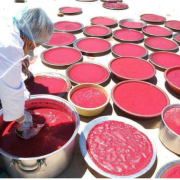Speeches Shim

Once a regional leader in agricultural production, Syria has been deeply impacted by conflict and by a changing climate. Millions of people have been displaced, which has left Syria’s agricultural sector in disrepair.
Farmers like Mustafa* have found themselves unable to afford the inputs they need to cultivate their land. For the past five years, he has suffered from this problem, even though his farm is the sole source of income for his family of 13.

Following a decade of conflict, many potential food processors in Syria find themselves without needed connections to quality vegetables at affordable prices, processing facilities, markets for their goods, and to each other. This influences not only their potential for income, but also the food security of their families. These critical links are exactly what their local Siraj Centers – supported by USAID’s Advancing Agricultural Markets in Syria (AAMS) program -- provide. Siraj Centers are community livelihoods hubs, established in conflicted-affected areas of Syria under the AAMS program, implemented by the Near East Foundation to provide technical and financial support to food processors and their businesses.

Prior to the Syrian conflict, thousands of households in the Raqqa governorate relied on income from olive farming. Over the course of the conflict, farm conditions and capacity were severely degraded, due to farm damage and the use of olive wood for fuel. Limited access to reliable water and essential harvesting equipment led to meager harvests, leaving farm owners unable to earn sufficient incomes to provide for their families.

When ISIS occupation ended in western Deir ez-Zor governorate of northeast Syria in February 2017, communities faced the challenge of rebuilding. Years of conflict destroyed critical services, including access to electricity and water, which limited opportunities to earn a living. After USAID worked with local governance to restore the region’s power supply, the local Agriculture Committee saw the potential to spur further economic growth.

Khalid is a farmer in the Hasaka Governorate of northeast Syria. The primary breadwinner for his family, he long hoped to build a small greenhouse on his land so he could grow summer crops, but he did not have the money. Khalid’s options were limited, until he learned about an opportunity for agricultural training and small grants from USAID’s Advancing Agricultural Markets in Syria (AAMS) program, implemented by the Near East Foundation. He applied, hoping the support would allow him to build his greenhouse.

Comment
Make a general inquiry or suggest an improvement.